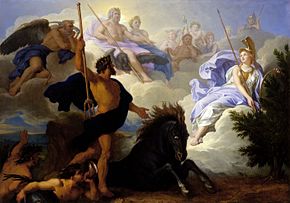
Back خرافة قومية Arabic الاسطوره الوطنيه ARZ Εθνικός μύθος Greek Nacia mito Esperanto Mito nacional Spanish Roman national French ರಾಷ್ಟ್ರೀಯ ಪುರಾಣ Kannada 민족 신화 Korean Mit narodowy Polish Национальный миф Russian

A national myth is an inspiring narrative or anecdote about a nation's past. Such myths often serve as important national symbols and affirm a set of national values. A myth is a mixture of reality and fiction, and operates in a specific social and historical setting. Social myths structure national imaginaries.[1] A national myth may take the form of a national epic, or it may be incorporated into a civil religion. A group of related myths about a nation may be referred to as the national mythos, from μῦθος, Greek for "myth".
A national myth is a narrative which has been elevated to a serious symbolic and esteemed level so as to be true to the nation.[verification needed][2] The national folklore of many nations includes a founding myth, which may involve a struggle against colonialism or a war of independence or unification. In many cases, the meaning of the national myth is disputed among different parts of the population. In some places, the national myth may be spiritual and refer to stories of the nation's founding by a God, several gods, leaders favored by gods, or other supernatural beings.
| Part of a series on |
| Nationalism |
|---|
National myths often exist only for the purpose of state-sponsored propaganda. In totalitarian dictatorships, the leader might be given, for example, a mythical supernatural life history in order to make them seem god-like and supra-powerful (see also cult of personality). In liberal regimes they can inspire civic virtue and self-sacrifice[3] or consolidate the power of dominant groups and legitimate their rule.
- ^ Bouchard, Gérard (2013), National Myths: Constructed Pasts, Contested Presents, Routledge, ISBN 9780415631129, retrieved 2024-05-25
- ^ Renan, Ernest (1882). Qu'est-ce qu'une nation?.
- ^ Miller, David (1995). On Nationality. Oxford University Press. ISBN 0-19-828047-5.